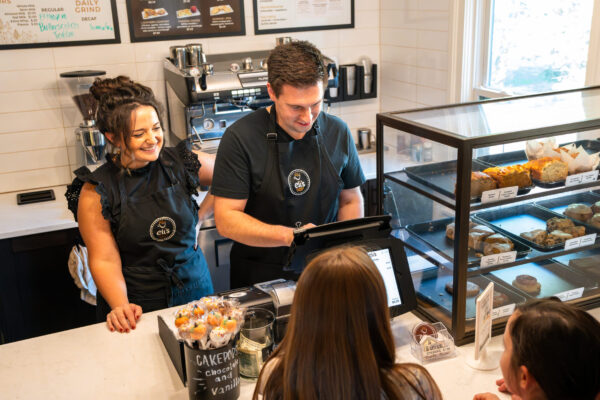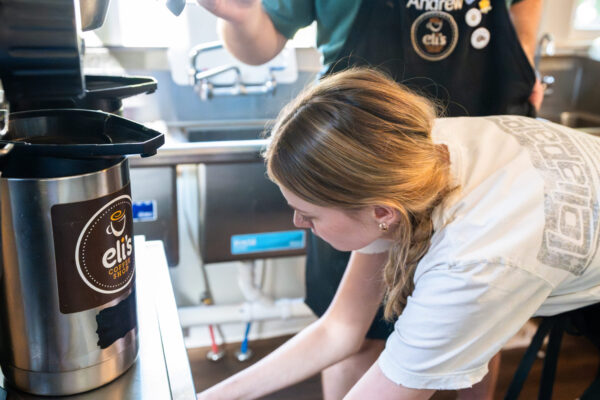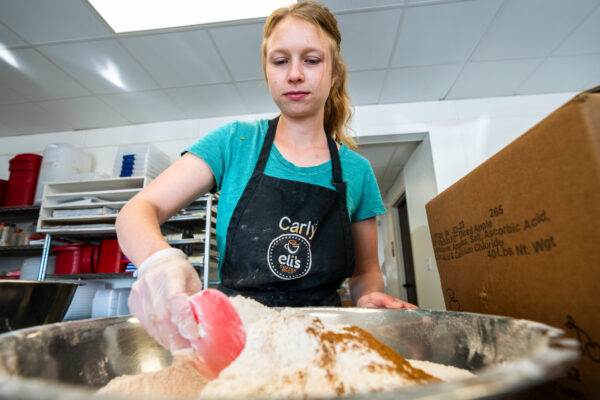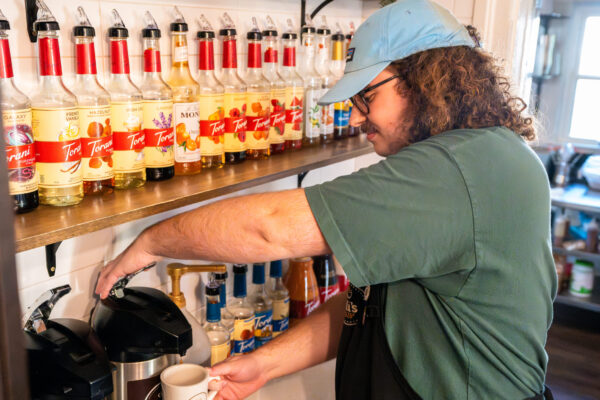The increased costs associated with tariffs impact all of us, affecting millions of people. Retailers of all kinds across Illinois import many of the goods they sell. Tariffs have created more uncertainty for retailers than many have ever experienced. The Illinois Retail Merchants Association has found that while retailers are trying to hold-off on price increases, it’s impossible to absorb the extra expenses for numerous business owners who function on very small margins – which forces consumers to pay more.
Retailers like Rachel and Weston Berchtold, co-owners of Eli’s Coffee Shop with locations in Morton, Tremont and Metamora, enrich our economy and strengthen our communities, even during the uncertainty of increased tariff expenses. To better understand how Eli’s is dealing with the escalation of existing tariffs, we sat down for a conversation with Rachel and Weston.
Ever crave that perfect cup, the one brewed with heart in a place that feels like a second home? In central Illinois, the go-to destination for many java lovers is Eli’s Coffee Shop, a cherished, local coffee concept with a legacy of more than twenty years. What started in 2005 with the transformation of a vacant historic house in Morton into a bustling coffee shop, has blossomed into a three-location enterprise with cafés in Morton, Tremont, or Metamora. Eli’s is owned and operated by Rachel and Weston Berchtold who bought the chain in 2015.
Ninety-nine percent of all coffee is imported from other countries including Brazil, Costa Rica, Mexico, and Colombia. New tariffs on international commerce have impacted the coffee industry unlike any other sector. Beyond coffee itself, Eli’s also imports a wide range of packaging for its bakery products and drink selections, most notably their cold cups which come directly from China. The threat of rising prices due to the tariffs is very real, potentially forcing Eli’s to raise prices on its daily grind drip coffee which is its top-selling product. Will loyal customers be able to afford a daily cup of coffee in the face of escalating tariffs, Weston wonders?
“It’s one more thing to worry about when we really just want to focus on serving great coffee to our customers,” said Weston.
IRMA: How are you dealing with rising tariff costs and their impact on Eli’s?
WESTON: I think the situation with the tariffs for us, just creates a lot of unknowns. It’s really difficult to make long-term decisions when we have so many unknowns about what things are going to cost, and what we are going to be paying for things like coffee and packaging. It makes it very difficult to plan ahead.
IRMA: So, what are you having to bring in from outside the United States?
WESTON: Currently we are, of course, importing all of our coffee. We can’t grow that here in the United States. So, all of that does comes from abroad. We also do import some packaging items, things like plastic cups, some paper goods, that kind of thing.
IRMA: Tell me more about packaging?
WESTON: Sure, in terms of the packaging, that currently comes from China, the biggest one right now is our cold cups. We have two different sizes of cold cups that we order about once every six months. Those come directly from China. That’s our biggest impacted product right now. There are a lot of different, smaller things that are coming from overseas, and that manifests in a lot of different ways such as the bottles that we use in our syrups. There’s a lot of different packaging products that may not even be just a single thing, but it’s a component in different things that that we’re ordering.
IRMA: Are you starting to hear from your vendors regarding prices and rising tariff costs?
WESTON: Some of the things we’re hearing from our vendors are a lot of unknowns. Right now, we are getting a lot of confusing messaging. Some vendors are already raising their prices. But some are saying just wait and see.
IRMA: How do you see the rise in tariffs impacting the coffee industry?
WESTON: Coffee retailers in particular are susceptible to tariffs because, like I said before, we can’t grow coffee here in the United States. We need warmer climates to grow coffee. That naturally happens in places closer to the equator around the world. So, we have to import all of our coffee. There’s no way to produce it domestically. That just creates a tremendous amount of unknowns for us when so many of these conversations around tariffs are up in the air.
IRMA: Have you had to raise your prices yet?
WESTON: We are expecting to need to raise our prices on coffee here soon. We haven’t done that yet. We’re waiting to hear from more suppliers on what their prices are looking like in the near future. But unfortunately, yes, we are expecting to raise prices on coffee soon.
IRMA: Talk to me about coffee as a commodity related to tariffs?
WESTON: I think the impact on coffee is so unique, because while it is a commodity, it is only a commodity in very specific parts of the world. And there are no other options. The harvests are so delicate. We’ve seen in the last couple of years, especially with issues like crop performance in countries like Brazil, how delicate the coffee market is. Tariffs add a whole new layer of complexity and a whole new layer of delicacy to that market.
IRMA: So, how will the price fluctuations in the coffee markets impact Eli’s coffee sales?
WESTON: I think in the consumer world, coffee is almost like gasoline. It’s a commodity that is ubiquitous across our world. For us as a coffee shop, regular drip coffee is still our number one selling product. So that has a huge impact on our customers who are visiting our shop. There are customers who come in sometimes once a day, once a week. Higher prices may prevent them from being able to enjoy that that same experience, day after day. They may have to back off how many times they’re visiting the shop, just based on how expensive the product might get. So, a customer will enjoy a cup of coffee today, or once a week as a treat. But once the price goes up, we worry that people are not going to be able to come as much. Then what happens to our business? So, if you’re an Eli’s customer coffee right now, you’re spending anywhere between $2 and $4 on average for a cup of our regular daily grind drip coffee. A lot of our customers who drink that coffee are in several times a week. Imagine if that price goes up by 30, 40, 50%? All of a sudden that cup becomes a lot more expensive, and it’s hard for customers to justify enjoying that several times a week. That’s what we see with this tariff situation. So, the biggest concern for us is with our base product, that thing that people enjoy day after day. Our worry is that drip coffee is going to become impossible to enjoy regularly. It becomes more of a special treat than a part of your daily routine.
IRMA: Will you have to raise the price on everything all at the same time eventually?
WESTON: Drip coffee will be increasing. We’ll have to wait and see what other product prices do, like packaging. We have a little more flexibility with our packaging purchasing, but we don’t have any flexibility with coffee.
When we’re buying beans from our roasters coming from Colombia, Costa Rica, Brazil, we have to take that higher cost of tariffs and pass it directly on to our customers.
IRMA: The range of emotions you must feel every day must be overwhelming.
WESTON: Emotionally, I think we’re somewhere between anxiety with maybe a little bit of anger. I think for us it’s been really difficult recovering from a lot of the post COVID price increases. We were really getting past that. Now to have the threat of tariffs on the horizon. It is just one more thing to deal with in this small business. That can make you angry. But I think a lot of our emotional response now is simply anxiety. We just don’t know what’s on the horizon and things are changing so quickly that it’s really hard to plan. We don’t know what to expect.
IRMA: Did you ever think you would be entangled in such a controversial mess?
WESTON: No. We now feel like we’re being caught up in a global trade war. That’s tough for a small business, when all we want to do is connect with our community and customers, not dealing with tariffs and trade issues. Tariffs are one more distraction and one more thing to worry about when we really just want to focus on serving great coffee to our customers.
IRMA: What message would you like to send to politicians at either the state or federal level?
WESTON: I think the message to our elected officials, both locally and nationally, is to remember all those small businesses. Plenty of huge companies get exemptions. Apple gets an exemption for selling phones. We don’t. Small businesses are often ignored in conversations about
global trade, even though retail employs more people in the state of Illinois than anyone else.
To learn more about Eli’s Coffee Shop: www.eliscoffee.com.










